The paradox of AI and qualification requirements: the skills-based hiring revolution
21 Aug 2025
Nick Litsardopoulos, Research Economist (Fellow)
This blog was originally published in July 2025 on the website of Adzuna, one of the largest online job search engines in the UK.
The impact of AI on qualification requirements presents an interesting paradox that varies significantly between occupational sectors and job roles. However, what looks similar across industries and occupations is the need for a familiarity with AI technologies and tools. The data reveals a complexity which might be indicative of the ongoing developments that are reshaping hiring practices across the board.
The use of AI systems and process automations is impacting recruitment both from the side of aspiring job applicants and the side of organisations doing the hiring. Advertisements for AI Agent Recruiters are becoming commonplace, as are promoters of AI tools who advocate for more use of such tools by job applicants to increase their chances in getting hired. One can see how someone’s hiring chances might get better if an AI Agent reads a job application written by another AI Agent. In a recent Bloomberg interview, Salesforce’ CEO Marc Benioff argued that AI Agents in his company already complete 30-50 percent of the task and that it will only keep increasing. If all these tasks at Salesforce that are now performed by AI Agents, were previously performed by tech, or marketing, or business graduates, then maybe there are going to be less available graduate jobs than there are graduates?
Already AI Agents can perform entry-level job tasks that were until yesterday performed by young graduates. According to McKinsey’s A new future of work Report, 30% of current work hours may be automated by 2030, resulting in an estimated 12 million occupational transitions in Europe by 2030. The report mentions that organisations plan to focus on retraining workers rather than hiring new ones. Hence, skills-based development appears to be a key factor in the era of artificial intelligence tools rather than traditional formal qualifications. However, these increasingly more sophisticated digital systems require higher skills to operate them. A paradox that arises from the dissemination of AI technologies across industries is that as the AI capabilities increase and allow tasks to be completed by employees with lower qualifications, at the same time the AI tools become more capable and sophisticated requiring more knowledgeable employees. Recent evidence shows that whilst on the one hand automation that decreases expertise requirements permits entry to lower expertise workers, on the other hand, automation that raises requirements increases the demand for higher expertise workers.
We find that the UK exhibits a uniquely pragmatic position regarding formal qualifications. Skills-based hiring is growing in popularity across the UK, as employers increasingly look at an applicant’s skillset and potential rather than solely at their academic qualifications. The UK has invested heavily in modern apprenticeship programs, creating viable pathways into skilled employment without traditional university routes. This has been particularly successful in sectors like engineering, IT, and financial services. This cultural foundation may have created fertile ground for AI-driven changes to take root more easily than in credential-heavy markets.
Using data from Adzuna’s intelligence portal we examine the required qualifications in the overall UK jobs market, and across several key occupational sectors in the UK. For the UK overall, we see that the RQF Level 6, that is a higher education (HE) Bachelor’s degree has fallen in demand, as has demand for RQF Level 8, that is PhD level qualifications. However, demand of Master’s level qualifications (RQF Level 7) increased during the same period, along with the demand for RQF Level 4-5, which covers vocational/further education qualifications and lower level HE certificates or diplomas (rather than Bachelor’s degrees), and RQF Level 2, that is for GCSE grade 4 or above. Interestingly, RQF Level 1 (most basic qualifications available in the UK) and RQF Level 3 (A Levels qualifications) also fell in the last 12 months we examined.
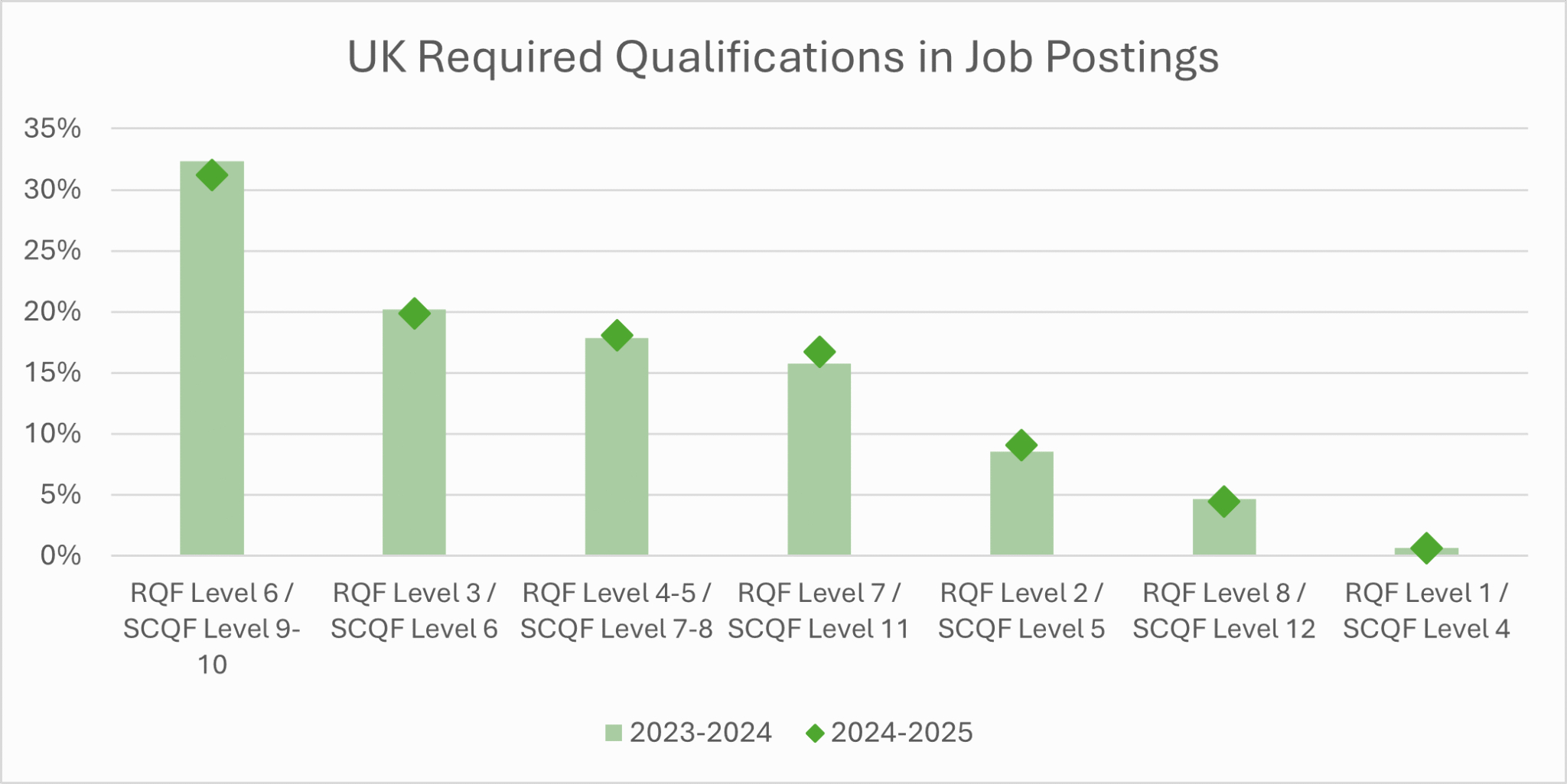
Hence, for the UK overall there is a rather mixed evidence regarding the demand for qualifications. Nevertheless, when considering the evidence from a skills-based jobs market, the required skills for jobs in a labour market experiencing the increasingly faster dissemination and application of AI tools and system automations, it may not feel so mixed after all. Recent evidence suggests that new employees using AI Agents performed as well as employees with more than 6 months of experience. It seems that AI Agents tend to upskill less experienced employees, helping them learn and perform tasks at a higher level that one would assume. Nevertheless, higher expertise employees gain the most when they take advantage of AI tools capabilities.
It may be that hires with advanced vocational/further education level qualifications (i.e. RQF Level 4-5 qualifications) using AI tools can perform (or at least are assumed to be able to perform) at par with employees with a Bachelor’s degree (i.e. RQF Level 6). Similar expectations might explain the drop in PhD level qualifications demand and the increase of Master’s level qualifications demand, or the fall in the demand for A-levels qualifications and the increase in demand for GCSE level qualifications. Effectively, moving towards the disappearance of demand for some in-between-level qualifications, when the gap of knowledge and/or experience can be bridged with the use of AI tools (e.g. AI Agents).
When we look at some major occupational sectors the demand for qualifications shows some important differences that likely has to do with industry specific skill requirements. For example, job postings for occupations in Education & Teaching have a higher demand for RQF Level and even higher for RQF Level 7 compared to the overall demand. This is likely directly associated with the minimum requirements for teaching positions, which require educational qualification at the Bachelor level or higher. The demand may also be related to the increased demand for teachers in the UK.
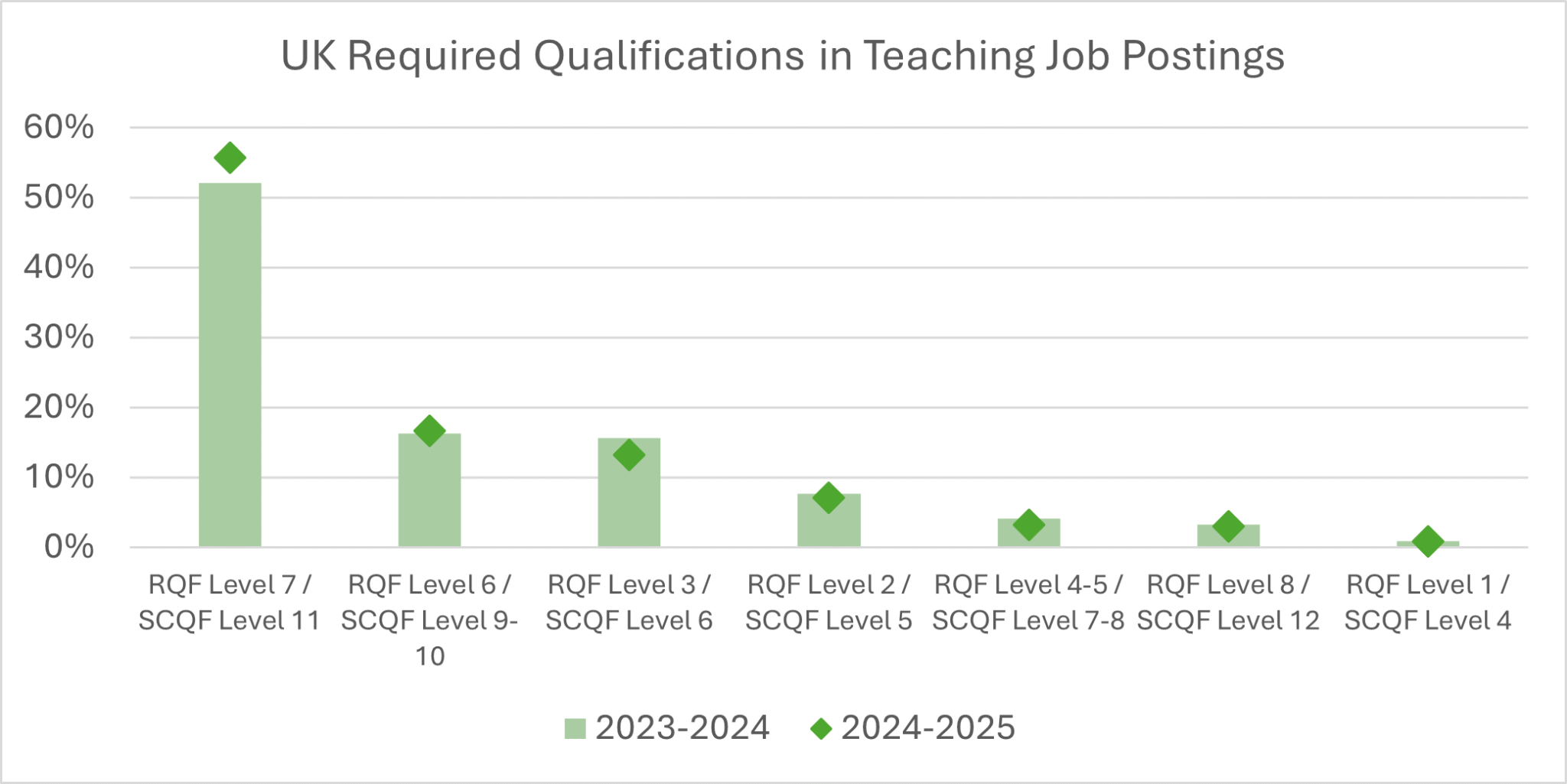
The Sales sector is one of the largest employment sectors in the UK. When we look at the changes in the demand for required qualifications in the job postings, we find that RQF Level 6 (i.e. Bachelor’s degree) has increased. In contrast, the demand for every other required qualification has fallen (RQF Level 1 has remained the same, but its share is negligible).
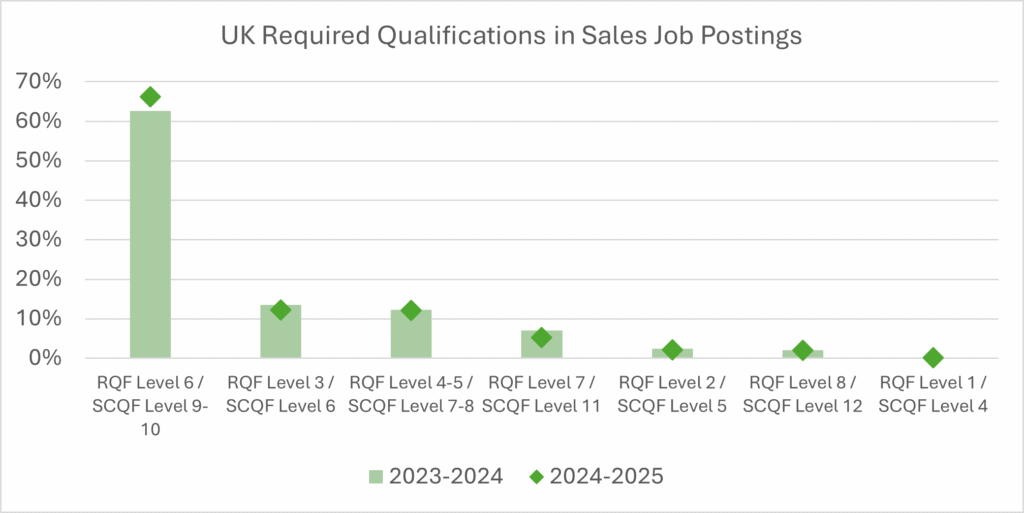
The recent changes in the demand for qualifications are more dramatic for Hospitality and catering occupations. The difference in the required qualification reveals a notable increase for RQF Level 2 qualifications (i.e. GCSE grade 4 or above), and also for RQF Level 3 (i.e. A Levels), whilst a notable fall in the required qualifications is recorded for RQF Level 4-5, Level 7, Level 8 and Level 1, with demand for RQF Level 6 (i.e. Bachelor’s degree) remaining unchanged over the period. Similar to occupations in other sectors, higher qualifications appear to have given ground to lower qualifications. Arguably, the Hospitality sector has a lower demand for employees with high level qualifications.
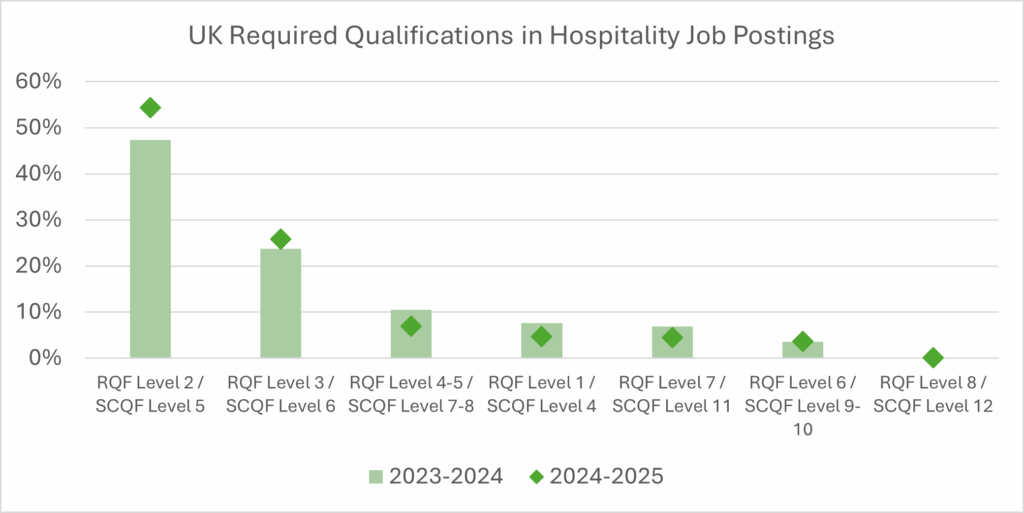
If the recent changes in the demand for qualification are associated to developments in the field of artificial intelligence and high tech, then it may be interesting to check what is happening in IT occupations. Looking at the IT occupations job postings we see that the demand for qualifications has increased for RQF Level 6 and Level 8, but has fallen for every other type of qualifications, apart from RQF Level 1 qualifications that has remained unchanged, but also accounts for only 0.2% of the demand. By far the highest demand for required qualifications in the IT job postings is RQF Level 6.
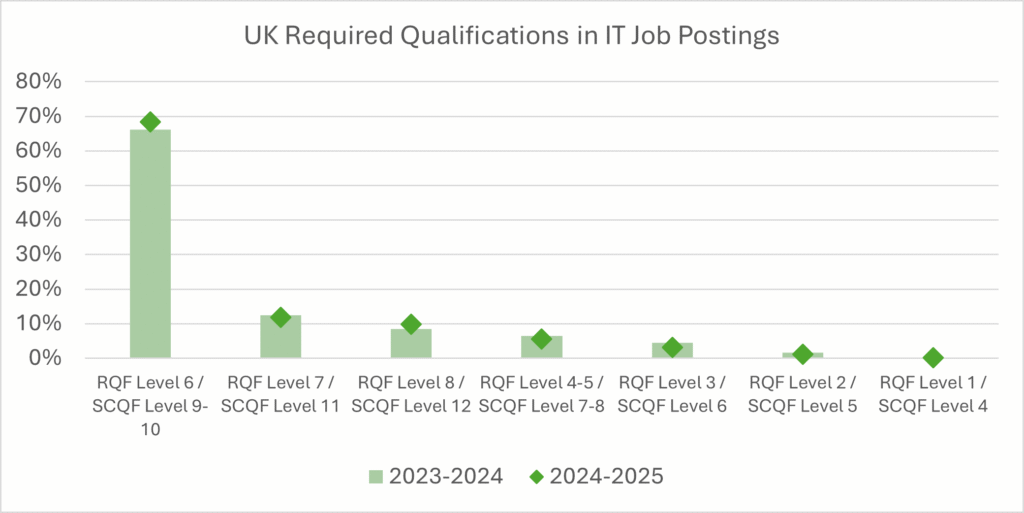
The apprenticeship renaissance
Central to Britain’s unique approach is its reinvention of apprenticeships, which has created robust alternatives to university education precisely as AI is making such alternatives more viable. The UK’s modern apprenticeship system has evolved far beyond traditional trades to encompass digital skills, financial services, and emerging technology sectors. These programs combine practical work experience with targeted education, producing workers who are immediately productive and AI-ready. Skills-based hiring may grow in popularity across the UK, as employers seek to take advantage of the UK Government Apprenticeships programmes.
Government investment in apprenticeships has been substantial, with initiatives that encourage employers to develop programs aligned with emerging skill needs. This has created pathways from school-leaver level through to degree-equivalent qualifications, providing career progression without traditional university routes. The apprenticeship levy system incentivises large employers to invest in training, creating a feedback loop that benefits both businesses and workers. The timing is crucial given McKinsey’s analysis that up to 30 percent of current work hours could be automated by 2030, with Europe requiring up to 12 million occupational transitions. The apprenticeship model appears particularly well-suited to the AI era, because it emphasises continuous learning and practical application over theoretical knowledge.
Job qualifications in Britain
The UK labour market presents a fascinating case study in how advances in artificial intelligence is reshaping qualification requirements, revealing trends that are both aligned with and distinct from global patterns. What emerges is a somehow mixed picture of a nation that is already moving toward skills-based hiring in some sectors, while in other sectors the demand for traditional university education has increased. It is likely that as AI implementation lowers expertise requirements in some sectors allowing employees with lower qualifications to enter, in other sectors with higher expertise requirements AI technologies actually increase the demand for expert employees.
Sectors with majority manual and in-person roles will find suitable employees among those without university level education, whilst other sectors will continue demanding employees who have graduate and post-graduate qualifications. The UK may be undergoing a similar demographic change as the US, where the gap between blue-collar and white-collar employment keeps growing both in demand and offered salaries. As young people pivot to studies that offer a pathway to higher paying jobs in tech and/or engineering, other employment pathways, such as apprenticeships, will likely act as pathways to lower paying jobs, in hospitality, caring, and other more manual or in-person job roles.
Any views expressed are those of the author and not necessarily those of the Institute as a whole.


